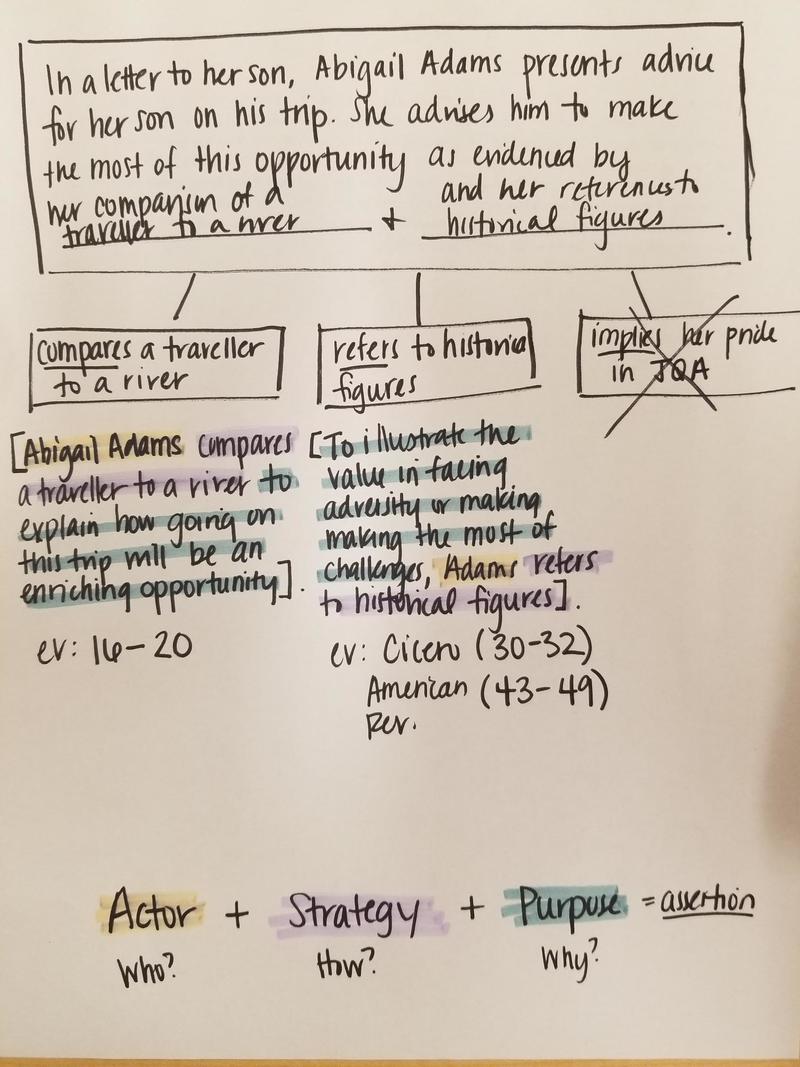|
Last week stayed pretty well on target. The kids completed their collaborative FRQs… kind of. Most of the groups ran out of time, but at least they got words on the paper. Our scores were in the 3 to 5 range - which is expected - and the kids weren’t actually that scared about Friday’s first FRQ. Now...what those look like - I have no idea. I was at a training Friday, so I haven’t seen any of the work yet. Regardless of how great (or not so great) those essays are - my plan is pretty much the same this week. Week 10Tomorrow, we are going to present their rubric projects so that students can really understand the rubric and holistic grading. Then, I am going to task them with table reading and picking out what we need to work on as a class. I use skills lessons or reteaches after each FRQ to make sure we are slowly correcting the issues that come up in their writing. After that we’re on to synthesis with an AWESOME activity I stole from Erin Palazzo - a great voice in the #aplangchat I look forward to every Wednesday. THANKS, ERIN! Being able to teach sincerely relies more on the people we surround ourselves with than our school initiatives or restrictions. A common illustration of this is the “Find Your Marigolds” advice we pass to new teachers: Surround yourself with a community that will help you grow, not weeds that will suck you dry. For me, my PLN (Personal Learning Network) helps me teach sincerely by giving me tools and ideas to stay true to what is most important to me. For instance, I believe strongly in authentic experiences, even when we are prepping for an AP exam. The High School Drama Synthesis Prompt is such a fun way to point out the type of discourse students see on a daily basis. I am so grateful that an idea like this was graciously shared. It may not be mine, but it falls right into place with what I sincerely want for my kids. Lesson Plans
1 Comment
So here's the deal… First let me apologize for the delayed post. I was in California consulting this weekend and I used about every spare second to grade my kids’ stuff. Now, let's talk the heartache of a weak performance on an assessment. What I realized while tackling their prewriting check was that the same old issues are popping up with rhetorical analysis. Describing strategies is so hard for them, and it seems like more of the same. I'm hoping my sample moves them in the right direction... but it's always discouraging. Sigh. Week 9But we are on the move nonetheless, the kids are tackling their first RA tomorrow, and I am honestly just hoping they finish. Ha! We all know the hard truth that is the first solo RA. They'll make silly mistakes you explicitly told them NOT to. They'll write "uses pathos" no matter how many times you tell them that doesn't make sense. They'll manage their time poorly, even though you did all the prewriting before class. Nothing feels quite as discouraging as that first FRQ, but we'll persevere! (After a little shock). Something I am passionate about is building a growth mindset. This week - or rather, whenever they get their scores - is ROUGH. A three kills them more than any F on a math quiz ever did, and for that reason, it's about a positive positive positive reaction for me: “You know, a three is pretty good when a 6 means you qualify to skip a year of college.” “You were so close! I needed one more sentence. Fill in the gap, and you're there!” “This is just a check in. We'll revise and keep at it!” So plaster on your best teacher smile, hide the panic, and brace yourself. It's FRQ week. Lesson PlansBack for a short week! Yay teachers' convention!! I won’t lie. I have a little bit of anxiety about the fact that this week is the first time we’re even digging into test materials. In theory, it’ll be smooth sailing because of all the critical reading prep, but I’m pretty sure the usual rhetorical analysis panic will soon be upon us. (There's a horror film in there somewhere). Week 8Here’s how I approach the RA essay...
And that’s the pattern I follow for all three with a few extra lessons thrown in for synthesis and argument. So this week, it’s modeling - task and passage analysis, writing claims and assertions, and evidence integration. (Oh my!) Update!Here are some images to support your modeling. I have my annotation of the Adams passage as well as my outline. As we begin our exam prep, I always find myself thinking about teaching authentically, or Teaching Sincerely. AP teachers are always conflicted by the “teaching to the test” feeling - and I am no exception. Here’s how I stay true, or sincere, to my own goals as an AP teacher…
Teaching Sincerely is about finding the best way to adapt to your teaching situation because that will never stay the same from year to year (or let’s be honest, PD day to PD day). So for me, AP is not about teaching to the test, but using what’s best in the test to teach what I sincerely care about. Make sense? Lesson PlansPhew! We are done with a unit. (Well, after Tuesday). It took us quite awhile, but next week, we are on to rhetorical analysis! I’m optimistic that the extra time with critical reading helps us out. As per usual, I found my kids struggling through determining purpose and tone on SOAPSTone. In order to make sure they were prepped for the test Tuesday, I went over collective feedback with them. Basically, I wrote out detailed notes about Purpose and Tone - which they then copied into their notebooks. Since those notes are available for their test, they can use these notes to get through those two tough spots on the test. Week 7BUT before we jump into RA, we are taking a pause to assess their reading habits. I have an Independent Reading Assessment for them to complete this week which will ask them to analyze the book they chose but also (and possibly more importantly), they will do a self-assessment of their own habits. To be honest, it isn’t a busy week. Just a test and this assessment. For me, Teaching Sincerely is about being able to pursue what you deem most important. Independent reading is one of those things for me. I look at the other teams in my building, and despite how much we all value this reserved reading time, it always takes a back seat - for a lot of different reasons. I myself even find that I will cut them off a couple minutes early in order to get to the skills lesson. Nonetheless, the day I decided to give students reading time every day was an essential move for me. Even if it is just 50 minutes a week, I at least know I’ve got them engaging with text for that long. And, frankly, that’s a lot more reading than I did in high school. People sometimes scoff at me investing this much time here, but my kids scored better on their AP test and its a better bell ringer than anything I’ve tried to sustain in the past. Lesson Plans |
Archives
February 2024
AuthorSteph Cwikla has been a teacher since 2012, focusing on ELA curriculum. Now, she also works as an instructional coach, helping other teachers improve engagement and instruction. |










 RSS Feed
RSS Feed